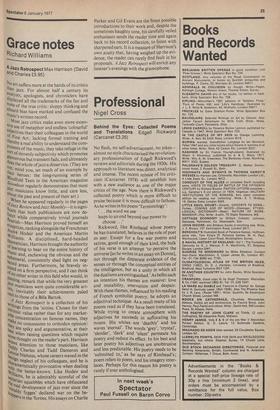Grace notes
Richard Williams
A Jazz Retrospect Max Harrison (David and Charles £5.95) N0 art suffers more at the hands of its critics than jazz. For almost half a century its ,an, alYsts, apologists, and chroniclers have 'IsPlayed all the trademarks of the fan and nnne of the true critic: sloppy thinking and absurd bias have marked and confused the music's written record.
, Most jazz critics make even more extenWe use of metaphor and endless `colourful' adJectives than their colleagues in the world °r Fine Art ; lacking formal training and therebY a real ability to understand the in of the music, they take refuge n the of slovenly subjectivity which promotes glamorous but transient fads, and ultimately does the whole of jazz a disservice. (They are not, mind you, set much of an example by ,thelr heroes : the long-running series of olindfold Tests in the American magazine Pootheat regularly demonstrates that most .14,4z musicians know little, and care less, anout the past and present of their art.) ,When he appeared regularly in the pages azz Review and Jazz Monthly—it is sigtnI:cant that both publications are now de!uric« L while comparatively trivial journals nourish—Max Harrison proved himself an eAkeeption, ranking alongside the Frenchman 11.1.dre Hodeir and the American Martin .71Iliams. A disciplined, hard-headed `neoretician, Harrison brought the authority °r learning to bear on the entire history of en-lusle and, eschewing the obvious and the Dliemeral, consistently shed light on negsee. ted areas. Furthermore, he bravely in ted on a firm perspective, and I can think "f no other writer in this field who would, in 1,assing, remark that while the very greatest musicians were quite considerable ts, inevitably their achievements paled
xt to those of a Bela Bartok.
w4. ,Jazz Retrospect is a collection of his i„r,it,Ings from the 'sixties. Chosen for their 4"ble nsic value rather than for any marketn1 , Concentration on famous names, they tha'`e no concessions to orthodox opinion: hY are spiky and argumentative, at their s'„ t when raising questions which require thought on the reader's part. Harrison TraWs attention to those musicians, like LetddY Charles and Tadd Dameron and be ri,nie Niehaus, whose careers waned in the chilign neglect of his colleagues, and he is w.aracteristically provocative when dealing the better-known. Like Hodeir and seetti Ilarns, he is admirably scornful of the the arian squabbles which have obfuscated real development of jazz ever since the b -Y fYgges' declared war on the betters in the 'forties. His essays on Charlie Parker and Gil Evans are the finest possible introductions to their work and, despite the sometimes haughty tone, his carefully veiled enthusiasm sends the reader time and again back to his record collection, to listen with sharpened ears. It is a measure of Harrison's own acuity that, having weighed up the evidence, the reader can rarely find fault in his proposals. A Jazz Retrospect will enrich any listener's evenings with the gramophone.


































 Previous page
Previous page